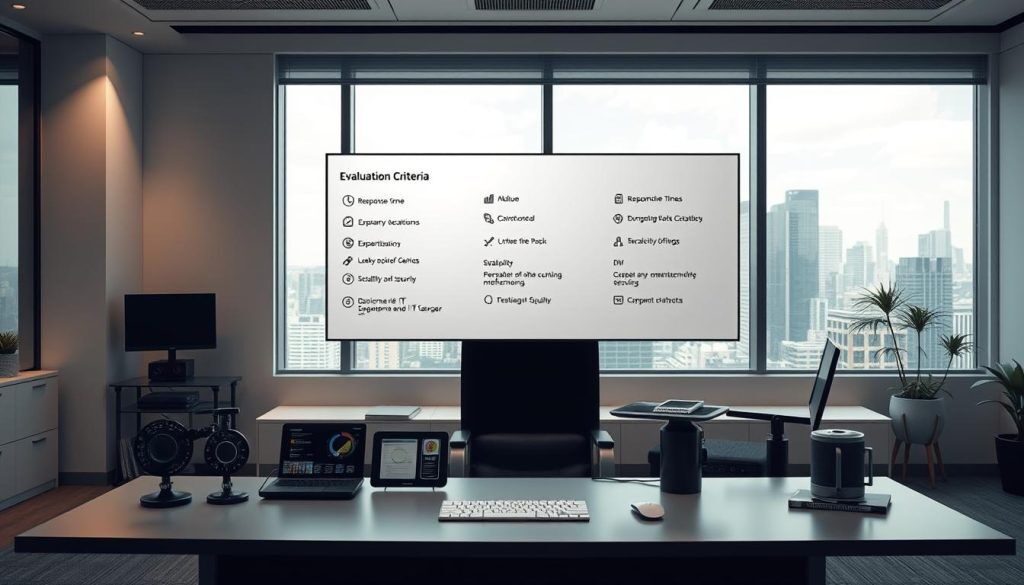How to choose an IT support company?
Is your current technology partner truly a strategic asset, or just another vendor waiting for something to break? In today’s digital landscape, this distinction defines market leaders. Modern operations depend entirely on resilient IT systems for security, efficiency, and growth.

Selecting the right support company is a pivotal business decision. This choice directly impacts your operational stability and capacity to scale. We understand that organizations need more than just quick fixes. They require a true partner who anticipates challenges and aligns technology with long-term goals.
This guide provides a clear framework for your evaluation. We empower you to move beyond basic promises and assess substantive capabilities. Our goal is to help you identify a service provider that acts as an extension of your team, driving your business forward.
Key Takeaways
- The right IT support company is a strategic partner, not just a break-fix vendor.
- Your choice directly affects operational efficiency, security, and scalability.
- Modern businesses need proactive solutions, not just reactive technical support.
- A thorough evaluation should cover both technical capabilities and business alignment.
- The ideal partner understands your industry and communicates with transparency.
- This decision requires assessing long-term value, not just short-term cost.
Understanding Your IT Needs
Before engaging external expertise, organizations must first conduct an honest inventory of their technological capabilities. This internal assessment forms the critical foundation for identifying your specific business needs and ensuring alignment with potential service providers.
Business Objectives and Growth Plans
We recommend mapping your company’s strategic goals against current technology capabilities. This analysis reveals where your systems support or hinder progress toward key objectives.
Your growth trajectory significantly influences technology requirements. Whether expanding operations or entering new markets, each scenario presents distinct infrastructure demands that must be accommodated.
Existing IT Infrastructure and Improvement Areas
A comprehensive audit of your current setup provides essential clarity. Document hardware, software, network architecture, and security measures to create a complete operational picture.
Identifying improvement areas allows for targeted solutions. Common focus points include outdated systems, security vulnerabilities, and inefficient processes that impact productivity.
| Current State Assessment | Identified Gaps | Desired Improvements |
|---|---|---|
| Legacy software systems | Limited scalability options | Cloud-based solutions |
| Manual data processes | Security vulnerabilities | Automated workflows |
| Basic network infrastructure | Bandwidth limitations | Enhanced connectivity |
This structured approach ensures your technology investment directly supports organizational growth. The alignment between business needs and technical capabilities creates measurable value rather than maintaining status quo operations.
The Importance of Experience and Expertise
Organizations benefit significantly from working with service providers who possess demonstrated success in comparable operational contexts. We believe that accumulated practical experience forms the foundation for effective technology partnerships, particularly when addressing industry-specific challenges.
Certified Professionals and Industry Knowledge
The qualifications of technical staff directly impact service quality. We recommend verifying that potential partners employ certified professionals with relevant credentials.
Industry-specific understanding extends beyond technical terminology. Providers familiar with your sector’s regulatory frameworks and operational patterns deliver more targeted solutions.
Proven Track Records in Similar Environments
A provider’s history with organizations of similar scale and complexity indicates their ability to handle your specific requirements. We suggest examining case studies and client references from your industry vertical.
This proven experience translates into faster problem resolution and more accurate assessments. The reputation of service companies within your sector serves as a reliable indicator of their effectiveness.
How to choose an IT support company? Essential Criteria
The distinction between adequate service providers and exceptional technology partners often lies in the depth of their documented capabilities. We recommend establishing a comprehensive evaluation framework that examines multiple dimensions of each candidate.

Evaluating Technical Skills and Success Stories
Technical competence forms the foundation of any effective partnership. We suggest requesting detailed information about team composition, including certifications and specializations relevant to your environment.
Success stories and case studies provide concrete evidence of capabilities. Look for measurable outcomes and methodologies that demonstrate problem-solving effectiveness in situations similar to yours.
Assessing Provider Reputation and Customer Testimonials
A service provider’s reputation offers critical insights into their reliability and service quality. We emphasize multi-source assessment through online reviews, industry forums, and direct client references.
Customer testimonials reveal the day-to-day working relationship dynamics. Beyond generic praise, identify specific comments about responsiveness, communication quality, and partnership approach.
Evaluating IT Service Offerings and Scalability
The scope and adaptability of a provider’s service portfolio directly influence your operational agility and long-term technological trajectory. We assess this by examining the breadth of available solutions and their capacity to evolve alongside your organization.
Cloud Solutions and Managed Services
Modern technology partnerships often center on robust cloud and managed services. A comprehensive provider offers more than platform access; they deliver expertise in migration, security, and ongoing optimization.
This proactive approach ensures your systems remain efficient and secure. It transforms IT from a cost center into a strategic asset driving your business forward.
Customized Support to Fit Your Business Needs
Effective service is never one-size-fits-all. Superior providers invest time to understand your unique workflows and specific needs.
They tailor their solutions accordingly, ensuring alignment with your goals. This customization is fundamental for a partnership that delivers genuine, measurable value.
Scalability is the final critical component. Your chosen partner must demonstrate the ability to grow their services in lockstep with your expansion, preventing future disruptive transitions.
Security, Data Protection, and Cybersecurity
A modern technology partnership must be built upon an unshakable foundation of robust security and data protection protocols. We view these capabilities as fundamental, not optional, given the severe consequences of a single breach.
The evolving threat landscape demands constant vigilance. Your provider must demonstrate a proactive commitment to threat intelligence and advanced defensive strategies.
Compliance Standards and Risk Management
Adherence to industry-specific compliance frameworks, such as HIPAA or GDPR, provides a structured approach to security. These standards offer valuable guidelines for protecting sensitive information.
Effective risk management involves identifying potential vulnerabilities before they are exploited. This proactive stance balances strong protection with operational efficiency, creating a resilient posture.
Backup, Disaster Recovery, and Data Encryption
Comprehensive backup and disaster recovery plans are your final defense against data loss. We recommend solutions that include automated, encrypted, and geographically distributed backups.
Data encryption for information both at rest and in transit is a standard practice. It is essential for safeguarding against unauthorized access and ensuring data integrity.
| Essential Security Practice | Provider Capability | Business Impact |
|---|---|---|
| Proactive Risk Assessments | Identifies vulnerabilities before exploitation | Prevents costly security incidents |
| Enterprise-Grade Encryption | Protects data in transit and at rest | Ensures confidentiality and compliance |
| Tested Disaster Recovery | Validated procedures for rapid restoration | Minimizes downtime and data loss |
Verifying these practices ensures your partner contributes to a secure and stable operational environment. This due diligence is critical for long-term business continuity.
Flexible Support and 24/7 Availability
When evaluating potential technology partners, their capacity to provide uninterrupted service across all time zones represents a critical differentiator. We recognize that technical issues respect no schedule, occurring with equal frequency during nights, weekends, and holidays.
This reality makes 24/7/365 coverage essential for protecting operations from extended disruptions. The quality of your help desk services directly determines user satisfaction and overall productivity.
Rapid Response and Dedicated Support Teams
Quick response to technical problems minimizes business impact significantly. We emphasize that response time commitments should be explicitly defined in service agreements.
Dedicated teams offer distinct advantages over shared resources. They develop deep knowledge of your specific environment, which accelerates problem resolution.
Global Coverage with Local Language Capabilities
For organizations serving customers across multiple regions, geographical distribution becomes essential. Follow-the-sun models ensure local-hours support regardless of user location.
Language capabilities extend beyond translation to include cultural understanding. Native-language assistance improves communication and user experience dramatically.
| Support Model | Response Time | Best For |
|---|---|---|
| Basic Business Hours | Next business day | Small local operations |
| 24/7 Shared Team | Under 2 hours | Growing businesses |
| Dedicated Global Team | Under 30 minutes | Enterprise organizations |
Flexible support also includes scalability to adjust coverage during peak periods. Addressing the industry’s 40% help desk turnover rate through retention strategies ensures service consistency.
Pricing Models and Cost Transparency
Clarity in financial agreements forms the bedrock of a trustworthy technology partnership. We prioritize transparent pricing structures that eliminate surprises and build confidence.
This approach allows for accurate financial planning and aligns service expectations with the actual investment. Understanding the total cost of ownership is crucial for making an informed decision.
Understanding Pay-Per-Ticket and Other Models
Several common pricing frameworks exist, each with distinct advantages. The Pay Per Ticket model charges for individual support incidents, offering control for predictable, low-volume needs.
Alternatively, a Per User model provides a fixed monthly cost, ideal for optimizing your technology budget and ensuring predictable expenses. Your selection should reflect your organization’s unique usage patterns and risk tolerance.
We advise viewing this investment strategically. The true value extends beyond incident resolution to include enhanced productivity and security.
| Pricing Model | Best For | Key Consideration |
|---|---|---|
| Pay Per Ticket | Stable, low-volume support needs | Costs can spike during high-demand periods |
| Per User / Per Device | Growing teams needing predictable budgeting | Requires clear definition of included services |
| All-Inclusive Fixed Fee | Organizations seeking comprehensive coverage | Highest predictability, focuses on partnership value |
Request a detailed breakdown of services to compare proposals accurately. This ensures you understand what is included and can assess the total value proposition effectively.
Customer Service Excellence and Communication
The reputation of your entire IT organization is frequently judged by the interactions users have with the help desk. This reality elevates customer service from a simple function to a strategic imperative for any potential partner.
We believe that technical expertise is rendered ineffective if the support experience is frustrating. Therefore, evaluating a provider’s commitment to service excellence is as critical as assessing their technical skills.
Measuring Satisfaction Through KPIs
Objective data is essential for gauging true customer satisfaction. Leading providers track key performance indicators (KPIs) like CSAT scores and first-call resolution rates.
These metrics offer a clear picture of service quality and user experience. They should be regularly reported and used to drive meaningful improvement.
Continuous Improvement and Quality Assurance
Exceptional providers do not settle for static performance. They implement robust programs for continuous improvement, systematically refining processes based on feedback.
Formal quality assurance programs are equally vital. They ensure consistent, professional communication and technical accuracy across all support interactions.
| Critical Service Metric | What It Measures | Impact on Your Business |
|---|---|---|
| Customer Satisfaction (CSAT) Score | Immediate user feedback after a support interaction | Direct indicator of support experience quality |
| First Contact Resolution (FCR) Rate | Percentage of issues resolved on the first interaction | Reduces downtime and increases user productivity |
| Quality Assurance (QA) Score | Adherence to defined service and communication standards | Ensures consistent, professional support delivery |
Transparent communication about these programs demonstrates a provider’s commitment to partnership. It builds trust and ensures your customers receive the best possible experience.
The Role of Industry Certifications and Best Practices
Best practices in technology support represent the collective wisdom gained from countless successful implementations and continuous industry refinement. We view these established methodologies as essential frameworks that separate exceptional service providers from adequate ones.

Certifications from recognized organizations validate technical competency through rigorous testing. They demonstrate a provider’s commitment to maintaining current expertise in specific platforms.
Ongoing Training and Technical Certifications
Continuous education ensures professionals remain current with evolving technologies. We consider ongoing training programs non-negotiable for long-term partnerships.
Technical certifications should align with your specific infrastructure requirements. Providers maintaining relevant credentials demonstrate depth in the platforms you depend on daily.
| Certification Type | Validation Method | Business Value |
|---|---|---|
| Vendor-Specific (Microsoft, Cisco) | Platform mastery exams | Expertise in your core technologies |
| Framework (ITIL, CompTIA) | Methodology comprehension | Structured service delivery |
| Cloud (AWS, Azure) | Architecture and security testing | Modern infrastructure competency |
We recommend verifying certification maintenance policies during vendor evaluation. This reveals whether the provider prioritizes expertise as a competitive advantage.
Best practices evolve through professional communities and industry conferences. Providers who actively participate demonstrate commitment to continuous improvement.
Conclusion
Selecting the right technology partner is a defining decision for any modern organization. The way you conduct this evaluation directly shapes your operational resilience and capacity for growth.
We believe one thing is paramount: true alignment between your business objectives and your provider’s capabilities. This synergy is the foundation for a relationship that actively drives your success.
Make sure you invest the necessary time to ask probing questions. A thorough process will help reduce future technical issues and streamline your internal processes.
Keep in mind that the ideal support company does more than fix problems. They provide strategic guidance, secure your networks, and free your team to focus on core goals.
If your organization needs help navigating this critical choice, we invite you to start a conversation. Contact us today to explore a partnership built for your future.
FAQ
What is the most important factor when selecting an IT support partner?
The most critical factor is ensuring the provider’s expertise and service offerings align with your specific business needs and growth trajectory. We prioritize understanding your operational goals to deliver solutions that enhance efficiency and support long-term success, rather than offering a one-size-fits-all approach.
How can a support company help reduce our cybersecurity risks?
A proficient partner implements robust cybersecurity measures, including advanced threat detection, data encryption, and comprehensive backup and disaster recovery plans. We focus on proactive risk management and adherence to compliance standards to protect your sensitive information and ensure business continuity in case of an incident.
What should we look for in a provider’s service level agreement (SLA)?
Your SLA should clearly define response times, resolution targets, and availability guarantees, such as 24/7 help desk support. We believe in transparent SLAs that set clear expectations for performance and include key performance indicators (KPIs) to measure customer satisfaction and service quality continuously.
Why are industry certifications and technical accreditations important?
Certifications validate a team’s expertise and commitment to following industry best practices. They demonstrate a proven level of knowledge in managing complex systems and networks. Our professionals maintain ongoing training and hold relevant certifications to ensure we deliver cutting-edge technology solutions.
How do flexible pricing models, like pay-per-ticket, benefit our organization?
Flexible pricing models allow you to control costs by paying only for the support you use, which is ideal for businesses with fluctuating needs. We offer transparent pricing structures that scale with your operations, ensuring your investment in IT support directly correlates with the value received.
What role does communication play in a successful IT support relationship?
Consistent, clear communication is fundamental. It ensures you are informed about system status, ongoing issues, and strategic improvements. We establish dedicated points of contact and regular reporting to foster a collaborative partnership, keeping your team aligned and empowered.

